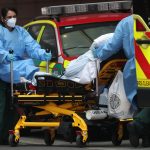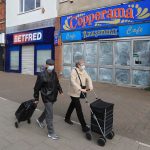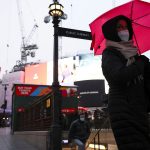Infection rates have continued to rise across England, Wales and Northern Ireland – but dropped in Scotland, according to the latest estimates.
Data from the Office for National Statistics shows that in the week ending 24 July, approximately 1 in 65 people were estimated to have had COVID-19 in England.
The rate was around 1 in 65 people in Northern Ireland, and around 1 in 160 Wales.
Meanwhile, the percentage of people testing positive in Scotland dropped in that week – around 1 in 110 people had COVID.
Though England’s infection rate went up in the week ending 24 July, there are “possible signs that the rate of increase may have slowed”, the ONS says.
The highest percentage of people testing positive for COVID in England was in the North East, while infections increased in all regions except for the East of England and the South West.
The percentage of people testing positive has increased for those aged two to 16, and those over 50.
The estimated prevalence of 1 in 65 in England is up from the 1 in 75 reported for the previous week.
Prime Minister Boris Johnson has lifted the last COVID restrictions in England in spite of the pre-dominance of the highly-transmissible Delta variant which concerns scientists globally.
The official daily number of cases in Britain started to fall from this wave’s peak of 54,674 recorded on July 17, 50,955 of which were in England.
The ONS looks to estimate infection numbers in the community beyond those who have been tested, giving an estimate of prevalence that is unaffected by fluctuations in people coming forward to be tested.
Cases rose steeply in the run-up to the end of legal coronavirus restrictions in England on July 19, and health minister Sajid Javid said cases could hit 100,000 a day after the unlocking.
Instead, the number of new cases recorded each day started to fall.
Epidemiologists have said that the end of the Euro 2020 football tournament and school summer holidays might have helped reduce the spread of the virus, as well as cautious behaviour in the population.
They also say the impact of the 19 July unlocking, which saw nightclubs re-opening and the end of social distancing requirements, will take a while to filter through to the data.
Daily reported cases fell for 7 straight days to a low of 23,511, but have risen on each of the last two days.






















